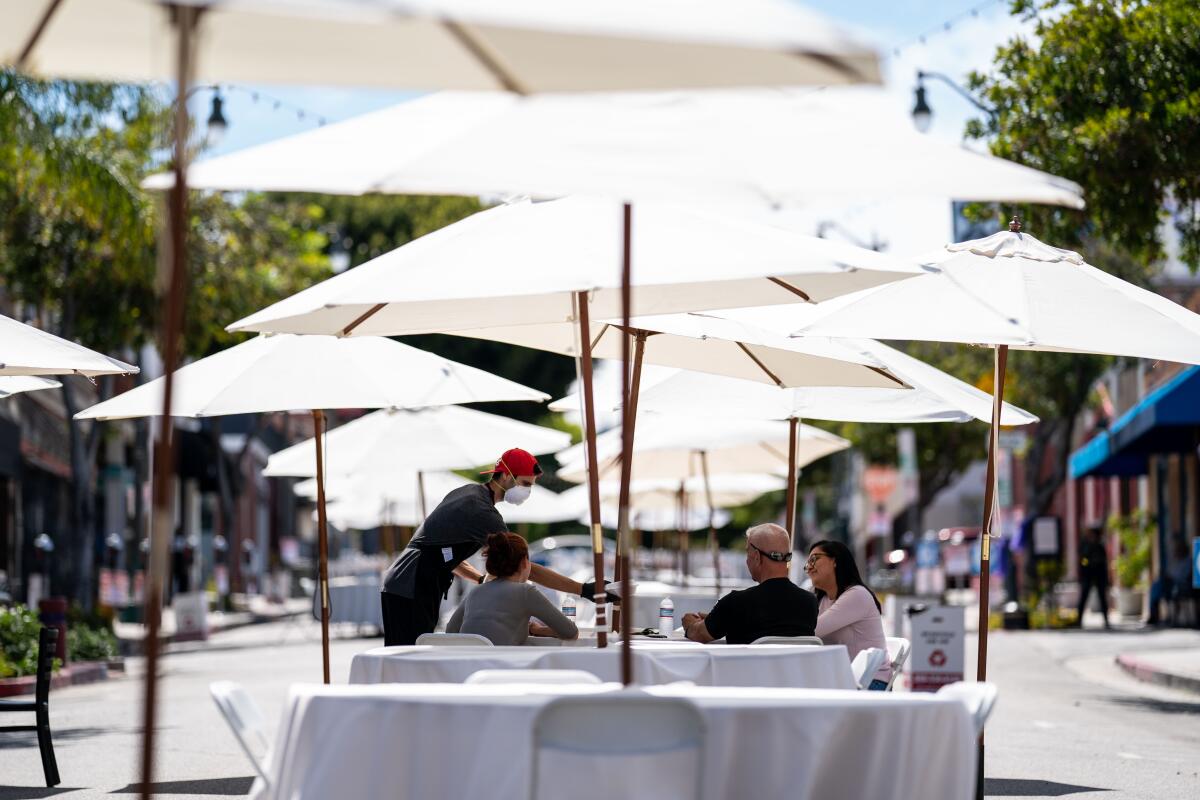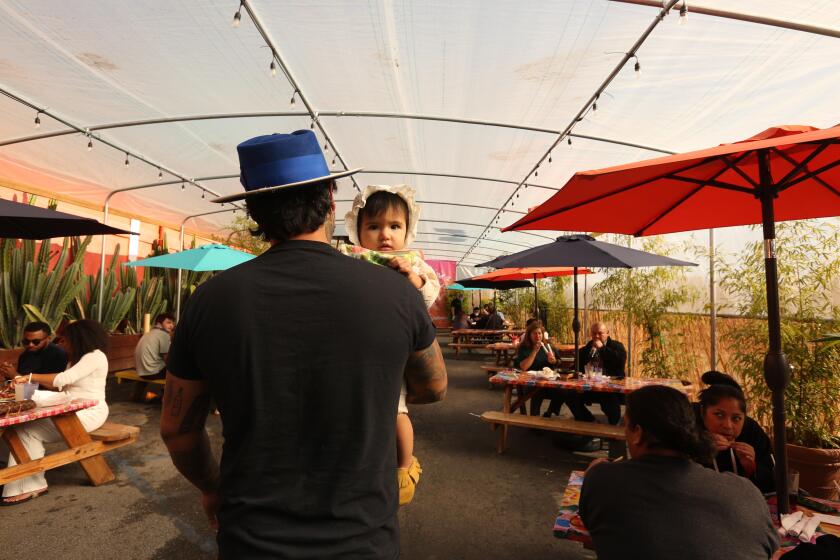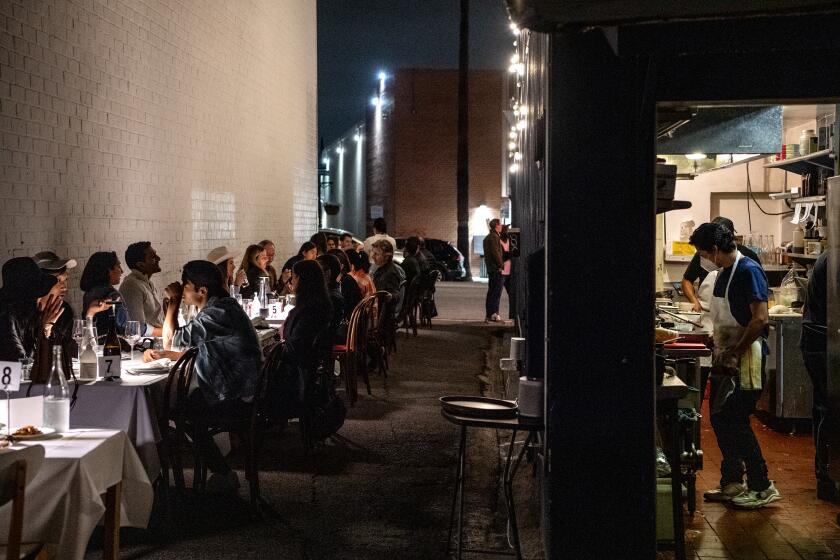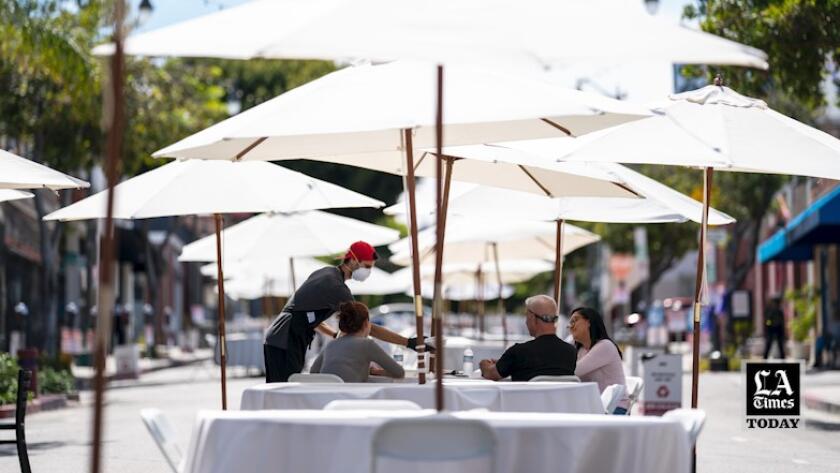A new California bill could save outdoor dining as we know it

- Share via
After years of pandemic-spurred pivots and local concern regarding the possible loss of parklet dining permits, restaurants could get help from a new state bill that would extend the life of temporary outdoor dining.
Assembly Bill 1217, authored by California Assemblymember Jesse Gabriel (D-Woodland Hills), aims to prolong the benefits of local and state programs such as L.A. Al Fresco that streamlined the application process and waived fees for restaurants and bars when operators could not seat guests indoors.
“These neighborhood restaurants are the backbone of communities across California,” Gabriel told The Times, “and during the pandemic so many of them were barely hanging on by a thread. Outdoor dining became this critical lifeline for them.”
In a city notorious among entrepreneurs for its crushing bureaucracy and culture of “no,” the L.A. Al Fresco program was an amazing transformation.
In 2020 owner Christy Vega Fowler said she spent $30,000 on two outdoor dining tents for Mexican restaurant Casa Vega in Sherman Oaks, plus $10,000 monthly to rent them. The hospitality group behind East Hollywood’s Found Oyster spent roughly $22,000 to install a parklet patio, while ownership of Los Feliz restaurant All Time said they spent around $30,000 on a new patio; should they lose it under L.A.’s proposed ordinance, they will have to retool their business plan and cut staff. A number of restaurateurs in Whittier each spent $2,000 to $3,000 solely on tables, umbrellas and planters.
If passed and subsequently signed into law, the statewide regulation would sustain many of the permitting leniencies and programs designed to help businesses pivot to outdoor dining by allowing the conversion of parklets, alleyways and sidewalks to new dining spaces. It also would supersede city and county ordinances such as November’s proposed ordinance in the city of Los Angeles, which is still under consideration and would require new permit applications and fees for restaurants hoping to maintain their Al Fresco-program setups.
“In short, our zoning rules clearly articulate a series of rules that restaurant owners must adhere to from parking to hours of operation, among many other considerations,” Yeghig Keshishian, L.A. City Planning chief external affairs officer, told The Times last month. “These rules did not go away with the emergency orders; they were merely relaxed for a specified period of time. In the end, all of our policies should balance business interests along with community impacts.”
In part, the new state bill was inspired by the news of L.A.’s recently proposed rules. AB 1217, introduced in February and yet to be scheduled for an assembly hearing, is in its nascent stages, though Gabriel expects a hearing in the coming weeks.
The proposed bill would build upon some of the pandemic relief found in Assembly Bill 61, a bill co-authored by Gabriel. That bill — which was signed into law in 2021 — extended flexibility to restaurants with temporary catering licenses, allowing for more outdoor food preparation, among other practices. Similarly, AB 1217 would extend the currently temporary relief measures such as conditional use permits for outdoor dining expansion and parklet conversion to al fresco seating.
Los Angeles restaurants brace for new restrictions and fees in a proposed permanent Al Fresco dining ordinance.
The assemblymember says he saw firsthand that the passage of AB 61 resulted in increased outdoor cooking for some restaurants, as well as new use of spaces such as alleyways and parking lots. The bill passed with bipartisan support, and Gabriel said the legislative team worked closely with the city of L.A. to create it; he remains hopeful that constituents and legislators across the aisle and in cities across California will rally around AB 1217 as well.
“The point here is to work with local governments and hopefully not to get in a fight with them,” the assemblymember said. “But at the end of the day, we’re not going to allow local governments to kill outdoor dining.”
A representative for L.A. City Planning did not respond to The Times’ request for comment regarding the possibility of cooperation with state legislators but did note that there are some similarities between the proposed state bill and the city’s proposed ordinance: “City Planning’s initial reading of the bill is that the City of L.A. is already moving in the same direction related to lessening parking requirements within planning and zoning provisions. City Planning is also taking the necessary steps to streamline the zoning rules to ease the process for existing Al Fresco participants, as well as new participants.”
Should the bill pass the assembly in the coming months, AB 1217 could be moved to Gov. Gavin Newsom around September, with the governor determining whether to sign the bill and others into law during the fall. With a number of state COVID-19-inspired programs and provisions set to expire in 2024, the proposed al fresco continuations could provide some permanence to a restaurant industry plagued for years by uncertainties and additional pandemic-induced operating costs.
“A lot of these businesses made major investments in outdoor dining during the pandemic; they invested tens of thousands of dollars, and a lot of them are still struggling,” Gabriel said. “They’re coming out of probably the worst couple years for restaurants in many, many decades.”
- Share via
Watch L.A. Times Today at 7 p.m. on Spectrum News 1 on Channel 1 or live stream on the Spectrum News App. Palos Verdes Peninsula and Orange County viewers can watch on Cox Systems on channel 99.
More to Read
Updates
12:40 p.m. March 17, 2023: This story has been updated with a quote from L.A. City Planning’s chief external affairs officer, Yeghig Keshishian, and comment from an L.A. City Planning representative.
Eat your way across L.A.
Get our weekly Tasting Notes newsletter for reviews, news and more.
You may occasionally receive promotional content from the Los Angeles Times.














